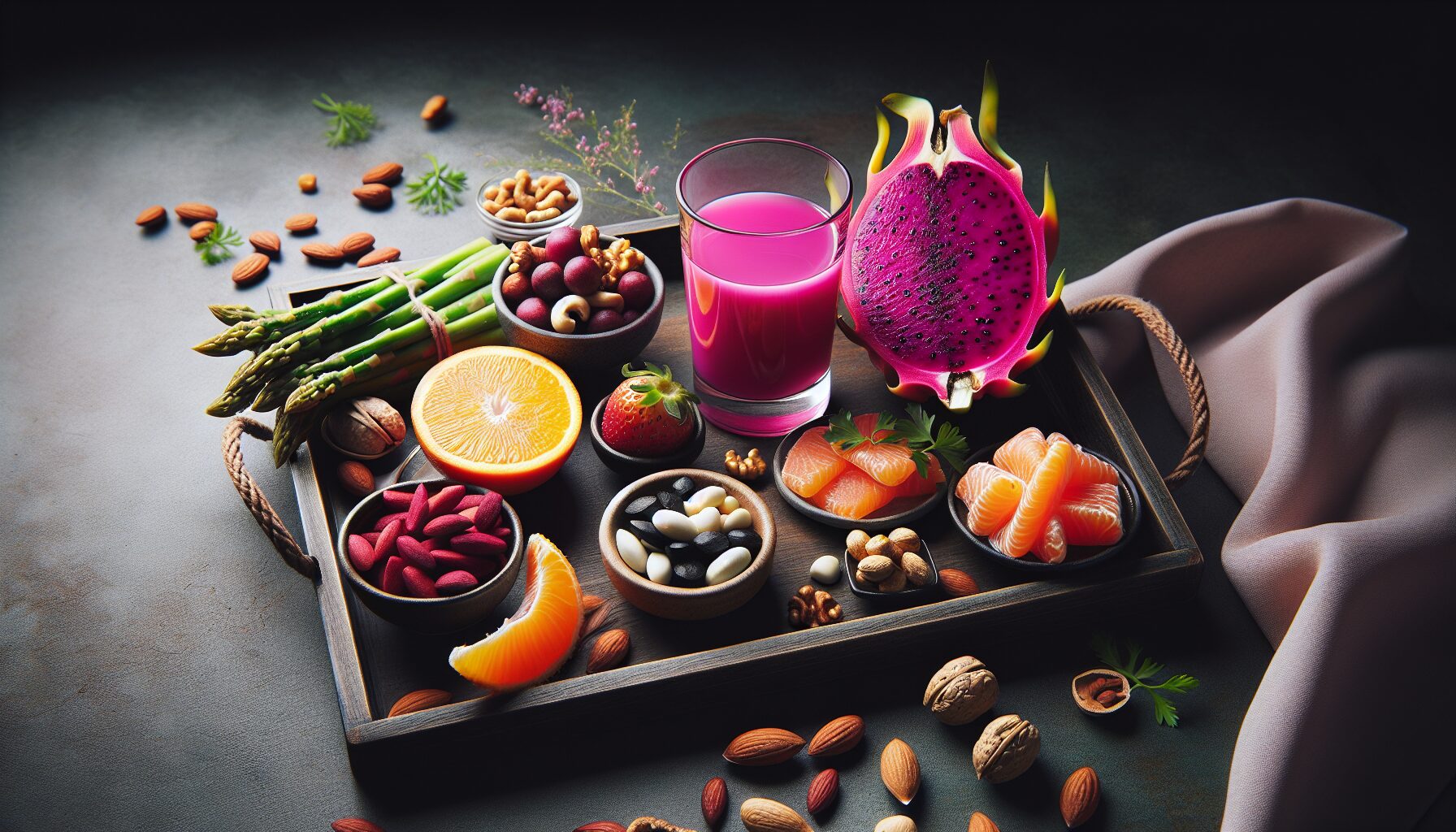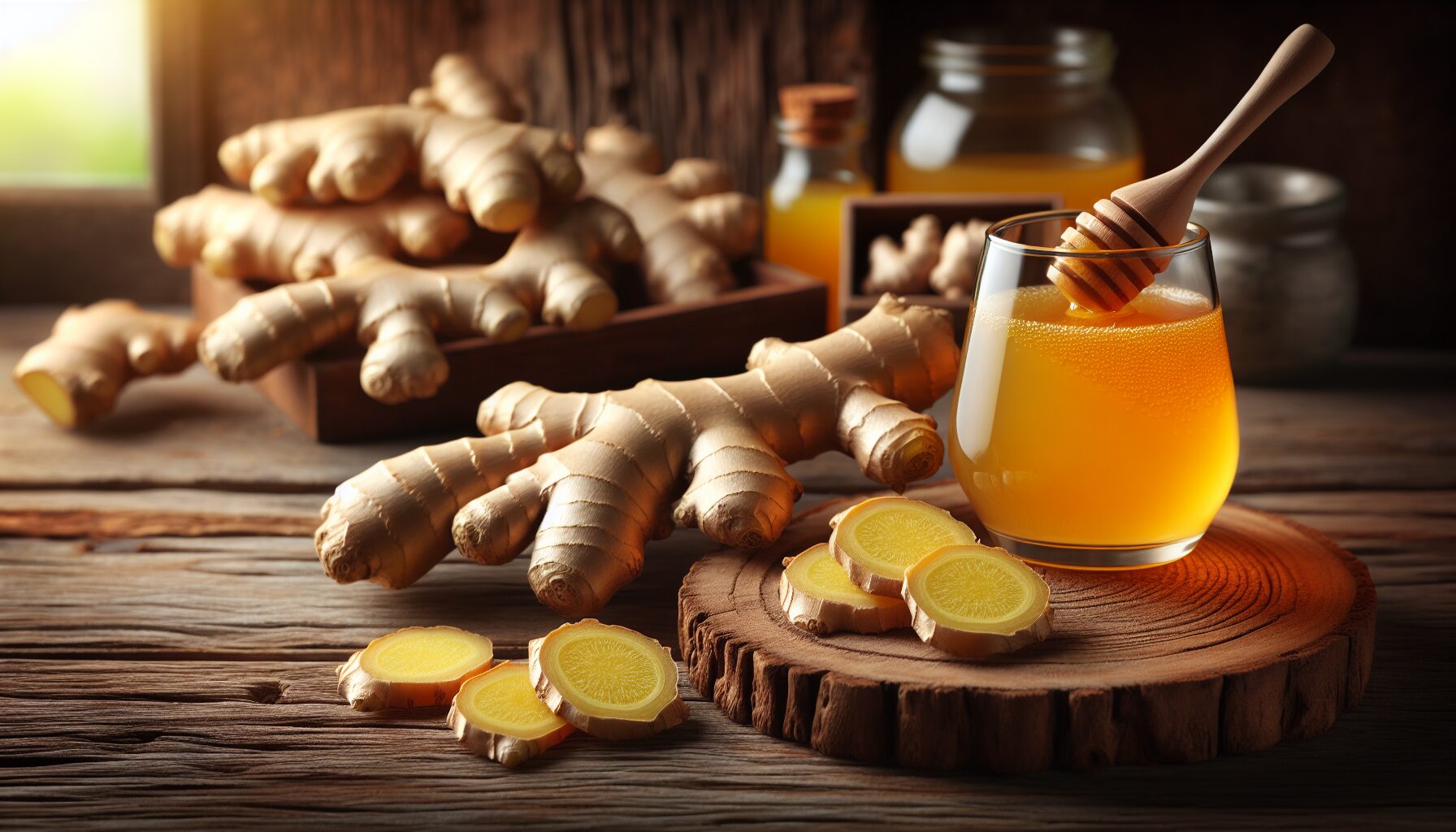
Ginger For Skin Health Wellness: Benefits Of Ginger For The Skin
Ginger extracts offer potential benefits for skin health through key nutrients that can help to improve the protective functions of our skin. This spice, native to Asia, is very popular in cooking and has been used in traditional medicines too for a number of years.
Typically, the roots of ginger are used in either cooking or medicines. The roots of ginger are loaded with antioxidants and other health supporting nutrients. These are really important for skin health, considering the amount of external damage or weathering that occurs to the skin on a daily basis. The skin is also one of the fastest replenishing organs in the body, so needs a lot of nutrients.
Various studies have indicated that ginger offers skin protective effects, which benefit the overall health and wellness of our skin. For example, one study showed how protective compounds in ginger are able to reduce cellular stresses on human skin cells to encourage their growth. This effect occurs through strong antioxidant compounds that encourage healing. Ginger extracts are often used in skin care products. Stated benefits of ginger for skin health include soothing, skin regeneration, acne prevention and improving collagen production.
In this article, the possible skin health benefits of ginger will be looked at to see if this spice could be of benefit for your overall wellbeing.

The Basics Of Skin Ageing
The skin is our largest organ, providing an essential barrier from pollutants and protects internal organs from damage.
Our skin becomes more and more damaged as we age. We accumulate damage through environmental stresses on the cells of the skin, which occurs through oxidative stress. Factors such as toxins, skin irritant substances or chemicals, excessive sun exposure and a lack of nutrients can all cause build ups of oxidative stress in the skin. Our bodies also produce oxidative molecules naturally in energy production.
This is the foundation of skin ageing, which leads to physical wrinkles, loss of elasticity or changes in colouration when the body is unable to repair the skin as effectively. Harmful reactive compounds in the skin change the nature of some fibrous proteins in the skin, such as collagen, producing these changes. Healthy skin collagen and other skin proteins are essential to maintaining a youthful skin appearance. The most important skin protein complex for overall structure is collagen. Other skin damages include skin membrane changes and genetic damage, which all trigger inflammation in the skin.
Skin fibroblasts are specific skin cells that regenerate the outer skin layer. They produce proteins, such as collagen, needed for elasticity and skin strength. Skin fibroblast cells can also become damaged from excessive inflammation, increasing collagenase activity and further accelerating skin ageing.

How Ginger Extracts May Benefit Skin Health
Antioxidant compounds, such as those found in ginger roots, are naturally effective in preventing oxidative stress and damage in the skin, therefore preventing skin ageing. Ginger is rich in specific antioxidants that protect the skin and also nutrients that may help to restore skin health. In traditional medicines, ginger root extracts are known as a natural anti-inflammatory food.
Ginger Flavonoids And Skin Health
Bioactive flavonoids within ginger roots are thought to be of particular benefit for preventing skin damage. These are key to why you may consider consuming more ginger for skin health. The flavonoids of ginger extracts have been shown to have benefits for the skin in supressing skin cell oxidative stress. The antioxidant activity of ginger flavonoids protects human skin cells from inflammatory signalling and therefore inflammatory induced damage or aging. Other studies have confirmed this. Showing that inflammatory cells decrease and fibroblast cells increase with the use of ginger extract, which could enhance skin health and optimise wound healing.
For example, luteolin is a flavonoid that suppresses inflammation and oxidative molecule production, reducing risks of skin ageing. Quercetin is a compound with similar activity. One study identified polymethoxyflavones in ginger, observing how they prevent ageing or inflammatory responses in skin cells and prevented collagen fibre degradation.
Some of the more exotic ginger root compounds with antioxidant effects include α-zingiberene, bisabolene, 6-shogaol, β-sesquiphyllandrene and α-bergamotene. 6-shogaol is heavily linked in many studies with antioxidant properties. This compound was shown to encourage anti-ageing activity in response to harmful UV B radiation, while having significant anti-inflammatory effects within skin cells. Studies have confirmed that ginger root essential oil can reduce skin damage induced by UV B. This included observable reductions in wrinkles and skin inflammation. It is possible that ginger extracts could have skin cancer preventative properties.
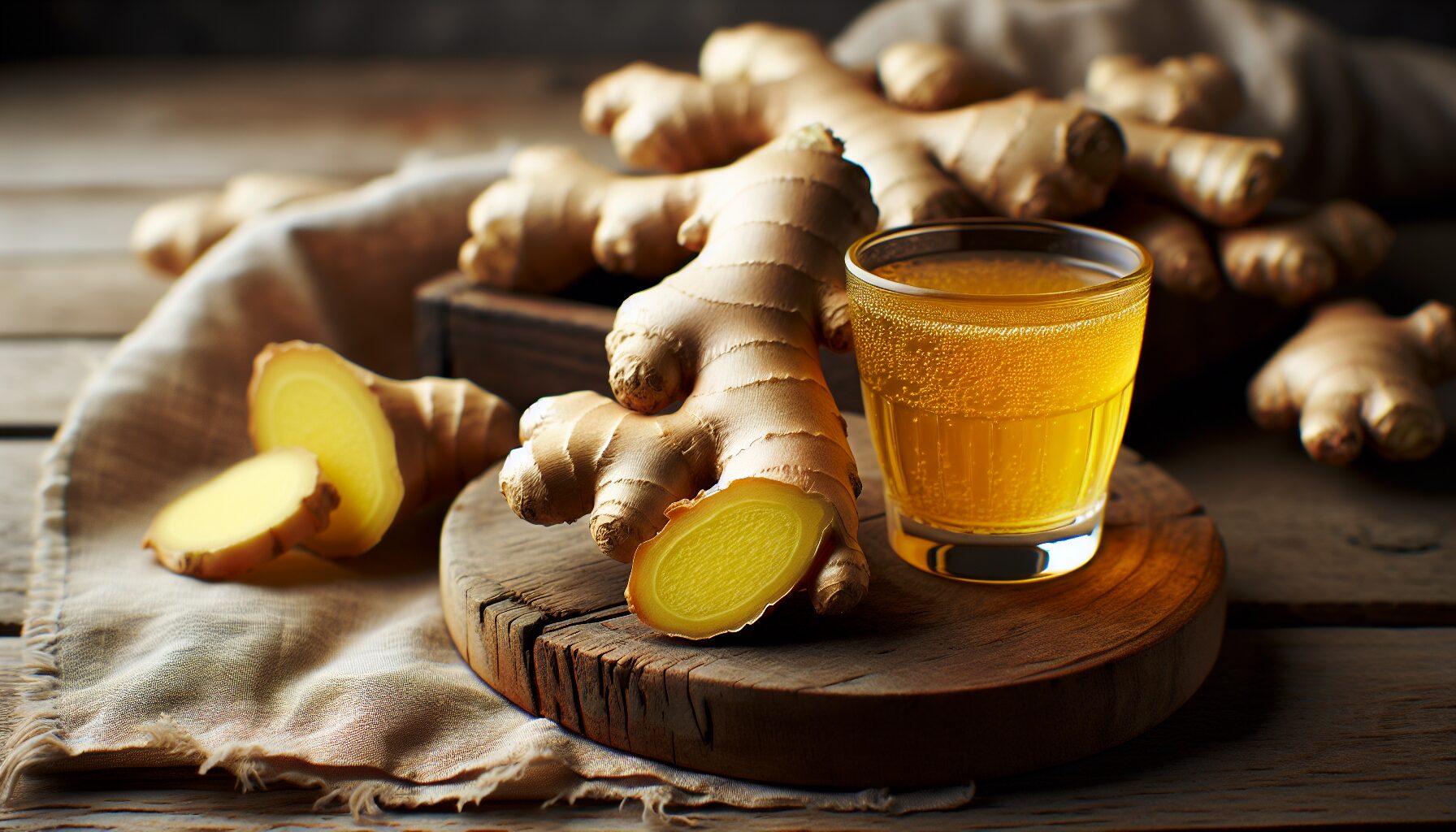
Gingerol
Gingerols are found in large amounts in ginger extracts and may have strong antioxidant effects that could have benefits to our skin. These are polyphenolic compounds with anti-inflammatory activities.
6-gingerol is the most abundant and considered to be responsible for most of its potential health benefits. Gingerol or 6-gingerol reduces overall oxidative stress within the body and so could have benefits for the skin. Extracts of ginger, containing gingerol or 6-gingerol, are thought to be one of the most potent herbal antioxidants available. Which means if you are looking for a natural skin health boost, ginger is possibly the best herbal extract to eat. Gingerol or 6-gingerol seems to boost the levels of glutathione, a key antioxidant within the body, which would encourage healthy skin cell activity. 6-gingerol may assist in reducing inflammatory responses in lupus and psoriasis patients.
Ultimately, ginger antioxidants can play a role in preserving skin health and reducing skin ageing. Their main bioactivity is to prevent oxidative damage to tissues and therefore oxidative stress. They can conserve and encourage the production of essential skin proteins or skin membranes, protecting the skin from damage. This includes proteins such as collagen, that are linked to visibly youthful looking skin.
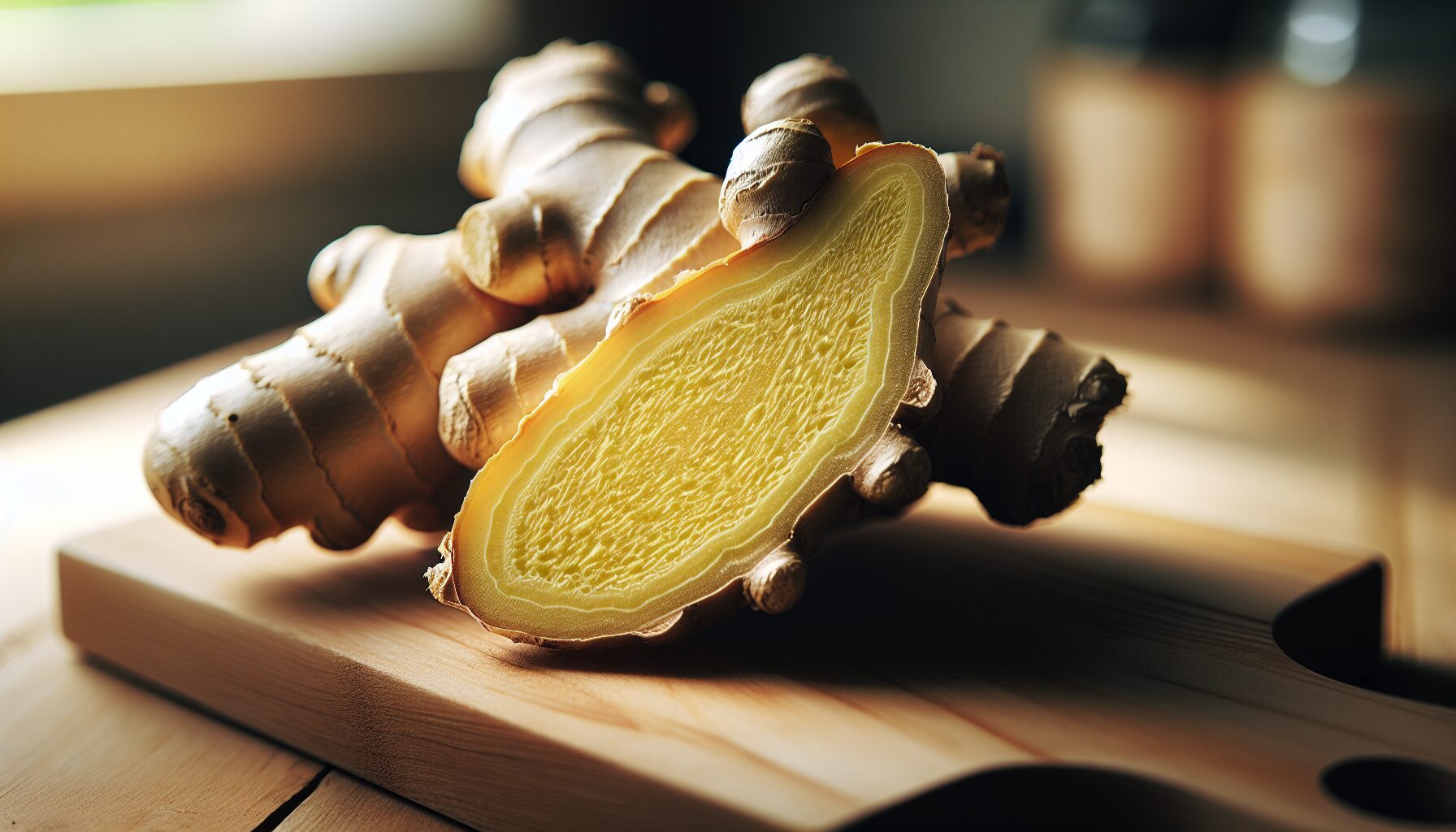
Antimicrobial Skin Benefits Of Ginger
Because herbs like ginger are often under attack from harmful microbes, they have developed some neat anti-microorganismal compounds. Ginger is used in traditional medicines to treat flu viruses, including the common cold. Gingerol might be able to deter the growth of certain microbes too which is another reason why ginger extract may be able to improve skin health.
Microbial growth on the skin has an effect on acne for example through sebum production, skin cell inflammation and skin cell damage. Gingerol has been shown to inhibit various effective against pathogenic bacteria and have anti-bacteriophage action. Other polyphenol compounds within ginger root may also contribute to this. The compounds in ginger extracts have been shown to have an antimicrobial activity against acne bacteria. Because of this the antimicrobial activity of ginger may also be effective in improving skin health.
Ginger also seems to provide an immune boost. They may be able to improve specific T-immune cells and could improve immune responses to new infectious diseases. This immune boosting action preserves key vitamins, like vitamin C, which could boost skin collagen production. This is another interesting way that ginger could have benefits for the skin.
Ginger Collagenase Blockers
Another interesting action of some ginger extract compounds is the prevention of skin protein degrading enzymes. Naturally this will improve skin appearance and health, reducing skin ageing, through the increased abundance of essential skin proteins.
The most active compound for this within ginger is octinoxate, found in large amounts in ginger root extracts. This compound may inhibit collagenases and elastases for example. That would improve levels of collagen, elastin and hyaluronic acid, which maintain skin structure, hydration and stiffness.
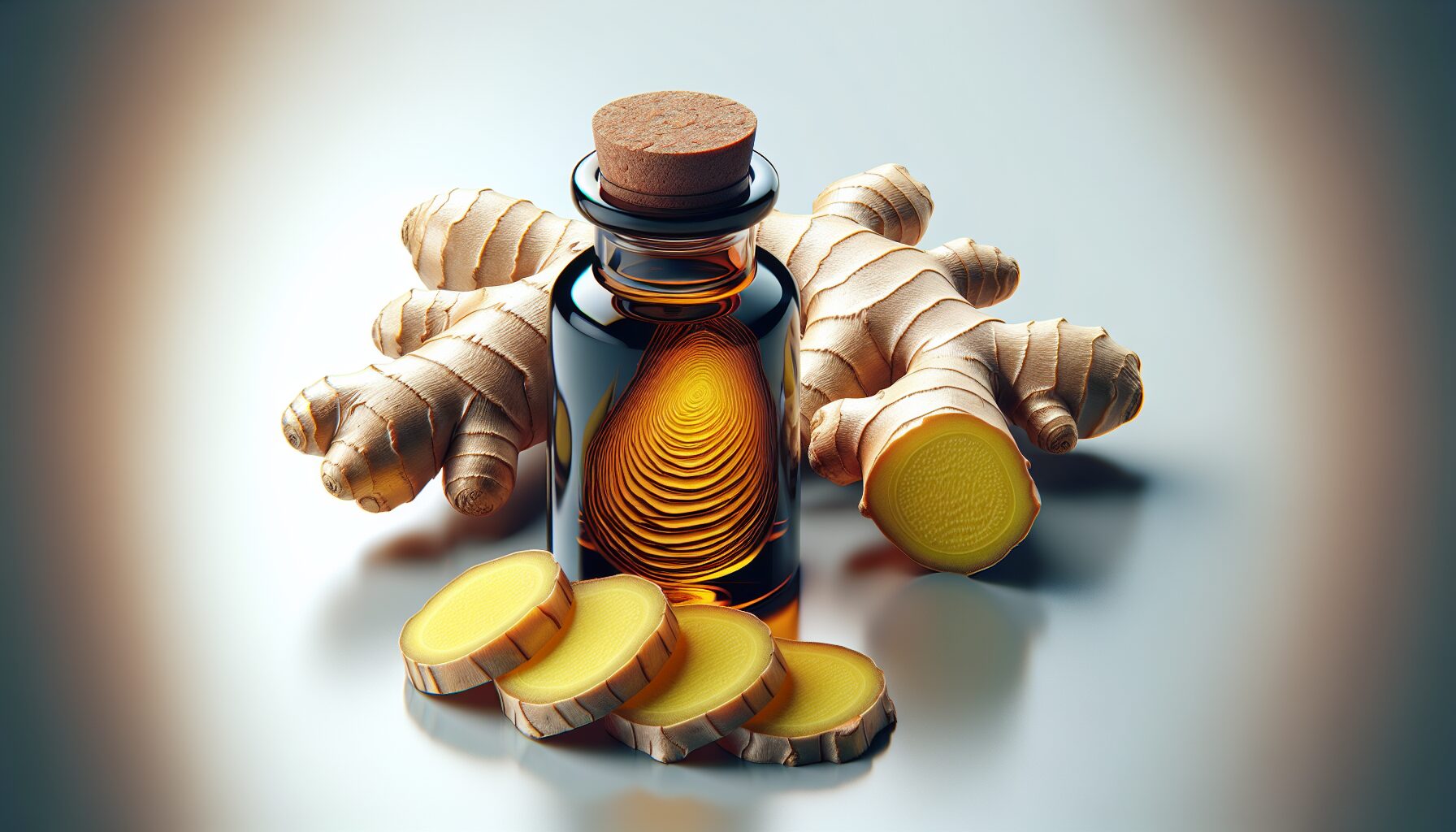
Ginger Dietary Fibres For Skin Health
A very much overlooked influence on our health and inflammation is our gut microbe composition. Being a root, ginger roots contain complex dietary fibres and ginger root contains 2g of dietary fibre per 100 grams.
Certain beneficial microbes in the intestines absolutely love these, while we cannot digest them ourselves. The dietary fibres in ginger root can be particularly interesting and complex, which is great for encouraging beneficial gut microbes.
Our gut microbes are highly implicated in skin health and can influence eczema through the immune system or systemic inflammation. Imbalances of gut microbes or pathogenic microbes worsen systemic inflammation and research shows that this influences eczema.
Harmful microbes may trigger inflammatory and immune system responses in our gut, which may worsen eczema. This happens because they disrupt the lining of our gut or villi which absorbs nutrients. That drains the body of nutrients and antioxidants that could be used to preserve skin health. Beneficial or probiotic gut microbes, that consume prebiotic dietary fibre, can help to lower inflammation within the gut while improving intestinal barrier function. There are clear differences in gut microbes between people with eczema and those with healthier looking skin.
Skin Microbes And Skin Health
Our skin can also become inflamed through increased numbers of pathogenic microbes, activating immune responses and making our skin layers thinner. This could make us more susceptible to skin diseases such as eczema. Our diets influence skin microbe populations and this is another way our diet, including consuming more ginger, can also reduce eczema and improve skin health. By eating ginger root we could improve numbers of beneficial gut microbes and reduce inflammation to improve skin health.
Research shows that the root of ginger has potential benefits to compliment skin health, promoting higher antioxidant status and higher levels of essential skin proteins.
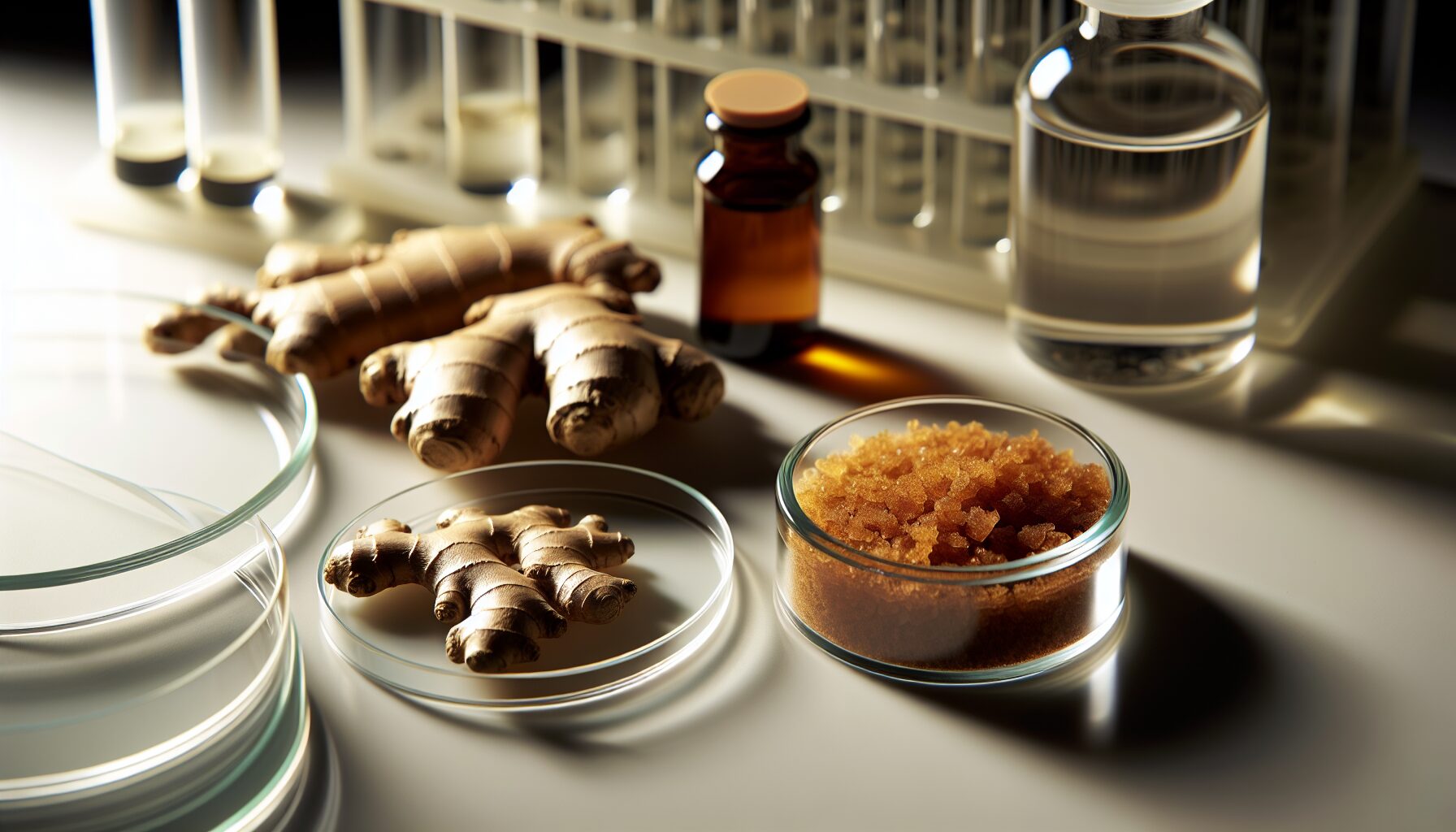
Summary
Ginger root is a spice used in cooking, while ginger has been used for centuries in traditional medicines. Some important properties of ginger include antimicrobial, antioxidant and resulting anti-inflammatory effects within the body. Because of this, ginger is thought to have potential benefits for skin health. The root of ginger is used in certain skin products.
Various studies have indicated that ginger offers skin protective effects, which could benefit the overall health and wellness of our skin. Ginger extract compounds may protect our skin cells from damage, shielding them from toxins or skin irritants that cause oxidative stress. They can change the nature of some skin proteins, such as collagen, or damage specific skin cells causing physical wrinkles or loss of elasticity. These are the foundations of skin ageing.
Exotic ginger antioxidants, including 6-gingerol or polymethoxyflavones, may act as an anti-inflammatory and encourage more optimal skin health. They may reduce inflammatory responses in skin cells and prevent collagen fibre degradation, which could promote more optimal skin health. Studies have confirmed that ginger root can reduce skin damage or anti-ageing activities induced by UV B, while also having anti-wrinkle potential.
Ginger also contains certain collagenase blockers. One of these is called octinoxate that could prevent collagen degradation and encourage a more youthful appearance.
Ginger could offer skin protecting benefits, from inflammatory skin diseases like acne or eczema. Ginger could do this via anti-microorganismal activity and also encouraging beneficial microbes with prebiotic fibre. Probiotic or beneficial bacteria can lower systemic inflammation and improve skin health, while harmful microorganisms do the opposite.
Research shows that ginger may have benefits for skin health via collagen promoting antioxidants, antiaging or anti-inflammatory compounds and beneficial microbes.
For more interesting articles, see the main articles page.




